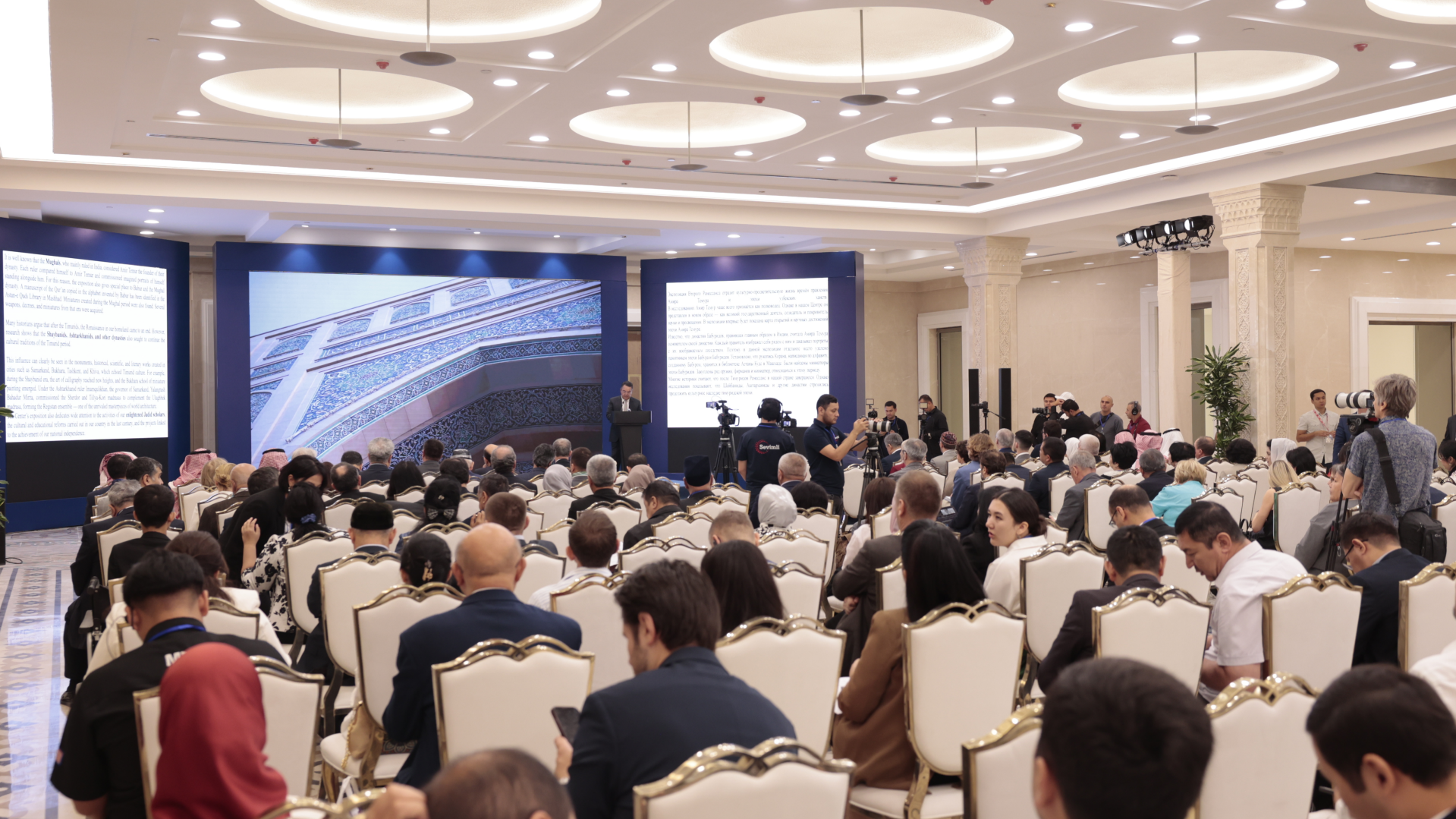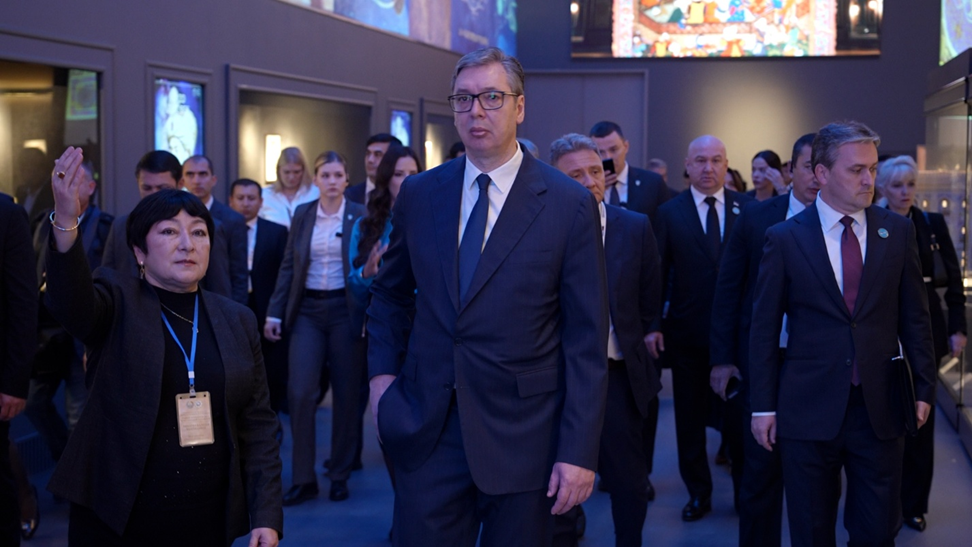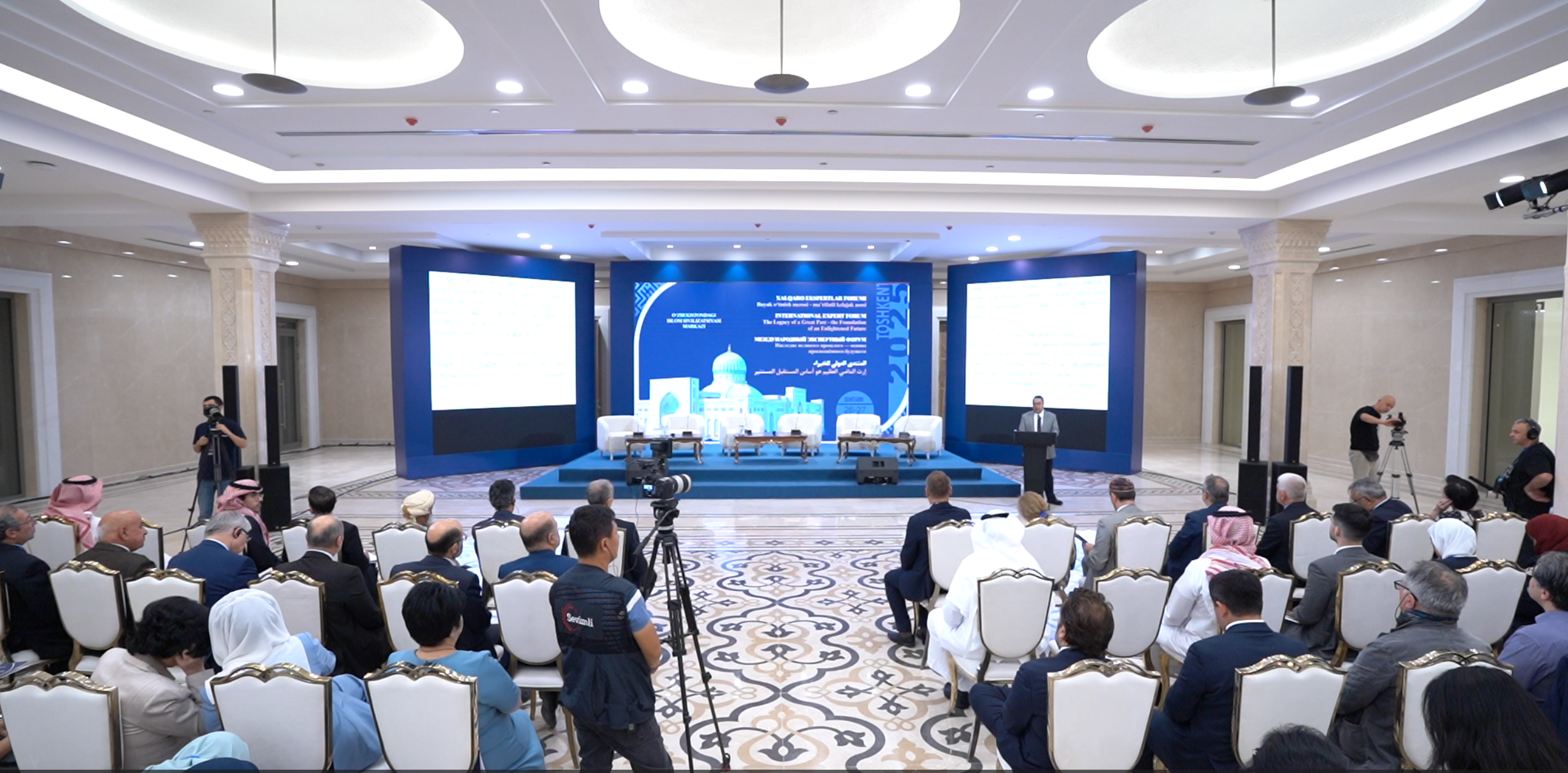Deputy Chairman of the Council of Muftis of Russia: “Witnessing a thousand-year-old tradition is a great event”
Deputy Chairman of the Council of Muftis of Russia and Rector of the Moscow Islamic Institute, Damir Mukhetdinov, highly praised the establishment of the Center for Islamic Civilization in Uzbekistan, which harmoniously combines spirituality and knowledge. Indeed, one of the most precious treasures of the Center’s museum is undoubtedly the Qur’an Hall, where the Kaaba covering (kiswah), presented to Uzbekistan by the Kingdom of Saudi Arabia last summer, and the famous Uthman Qur’an are displayed. According to Damir Mukhetdinov, visiting such a sacred place spiritually prepares a person for the pilgrimage to the House of Allah, the Kaaba.
“The kiswah,” he said, “is the sacred covering of the Kaaba in Mecca, which is renewed annually. The removed kiswah is cut into pieces and presented to specific individuals, officials, museums, and institutions. In the museum exhibition of the Center for Islamic Civilization in Uzbekistan, there is an installation featuring the door section of the holy kiswah and the keys of the Kaaba door. Seeing the kiswah closely and observing it attentively is, in a sense, a small ‘virtual pilgrimage’ to the House of Allah the Kaaba. It awakens in a person once again the deep love for that sacred place. This inner feeling begins with preparing oneself for this event saving money, making plans, thinking whether to spend one’s vacation at a resort or fulfill a religious duty. Thus, visiting such a place spiritually prepares a person for the journey to the Kaaba.”
Viewing the rare and priceless Uthman Qur’an copied by the great early figures of Islam together with the kiswah leaves an unforgettable impression. “By the grace of Almighty Allah,” Mukhetdinov continued, “I had the honor to be in this grand temple of knowledge, culture, and civilization. I personally saw the kiswah with my own eyes, touched it with my hands, and even took a photo. Perhaps I will hang that picture in the most visible place in my home.”
The Uthman Qur’an is one of the oldest surviving manuscript copies (mushafs) of the Holy Qur’an. Uthman ibn Affan, a companion of the Prophet Muhammad (peace be upon him), ordered the preparation of several copies of the Qur’an around 647 CE and sent them to different regions. Until the second half of the 19th century, this manuscript was kept in the Khodja Ahrar Vali Mosque in Samarkand. In May 1869, after Samarkand was occupied by the Russian Empire, the mushaf was taken to St. Petersburg. In August 1922, at the request of the Muslims of Turkestan, the sacred manuscript was returned to Tashkent. Today, the Uthman Qur’an is preserved in the “Muyi Muborak” Mosque within the Hazrati Imam Complex. The museum exhibition also includes other sacred books, their copies, and facsimiles. The value of these texts does not diminish when they are reproduced; on the contrary, as stated in the Hadith of the Prophet (peace be upon him): “For every letter of the Qur’an that one reads, one receives reward and merit.” Nowhere does it say that the Qur’an must be read only from the earliest manuscript or only from a printed copy. Every form of transmitting knowledge is acceptable and valued. On the other hand, although handwritten copies possess aesthetic beauty, they may also contain some errors.
It is known that early Qur’anic manuscripts preserved or discovered in different regions contain noticeable variations. For example, the famous Qur’an Codex (from the 7th–8th centuries, belonging to the early period of Islamic written tradition) is a clear example. A large part of it is kept in our own St. Petersburg Institute of Oriental Manuscripts. This shows that later generations of scribes and scholars made corrections to the original text. Therefore, from the viewpoint of disciplines such as tajwid and ʿulūm al-Qur’an, reading from an edited and republished modern version of the Qur’an today is more accurate and authentic. Yet, preserving and transmitting heritage especially safeguarding its authenticity—remains of exceptional importance.
When people debate about the “authentic Gospel” or the “authentic Qur’an,” such discussions often become controversial. Opponents of Islam claim that none of the original Qur’anic manuscripts written by Uthman (may Allah be pleased with him) or his scribes have survived. However, by collecting and displaying artifacts from around the world mushafs written in Kufa, Basra, Baghdad, and other regions we demonstrate that the Qur’an has reached us in the same form in which it was written during the time of the Prophet Muhammad (peace be upon him). Yes, there are differences in pronunciation and dialect, but these are known, studied, and transmitted both orally and in writing from generation to generation. The early Arabs did not widely distribute written works; knowledge was primarily transmitted orally. The fact that the Qur’an laid the foundation for the written tradition itself carries immense meaning and responsibility. The Qur’an later influenced philology and related disciplines linguistics, terminology, semantics, syntax, and others. In this sense, the Qur’an is profoundly authentic. Studying how it was compiled, memorized, and written, and how the art of calligraphy developed in early centuries what schools existed, how the text was adorned is deeply fascinating. These were entire schools Herat, Shiraz, Isfahan. Each era sought to reflect its own sense of beauty and culture in the pages of the Qur’an. The gathering of such mushafs in a center like this, seeing them with one’s own eyes, and witnessing a thousand-year-old tradition is indeed a great event.
I did not use the term “temple of knowledge” by accident. A museum is not a place of noise it is truly a sanctuary. Even during the circumambulation of the Kaaba, one can encounter noise, for even in the holiest place, millions of pilgrims performing Hajj or Umrah may hurry, step on one another, or, in moments of impatience, push others I have witnessed this many times. Noise can be found everywhere. What truly matters is that it does not exist in the heart. Observing the kiswah and the Qur’an fills the heart with peace, tranquility, spiritual balance, and contentment. We in Russia also strive to place examples of Qur’anic pages and their elements in centers of learning, so that even when surrounded by worldly noise, a person, by glancing at these sacred writings and great monuments, finds calmness, serenity, reconsiders their conduct and way of life, and silence returns within.
Most read

Over 100 experts from more than 20 countries of the world are in Tashkent!

President of Serbia Aleksandar Vučić visited the Islamic Civilization Center in Uzbekistan

The Center for Islamic Civilization – a global platform leading towards enlightenment













